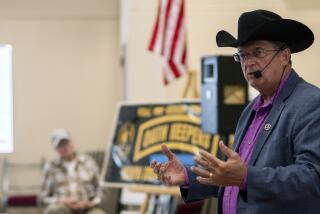Covering the schools
The blog era (or is it the post-blog era?) has already made it harder to believe H.L. Mencken’s old saw that freedom of the press is limited to those who own one. Now a bill awaiting Gov. Arnold Schwarzenegger’s signature may further weaken the once-mighty grip of an important class of publishers: high school and college administrators.
The “Journalism Teacher Protection Act” sponsored by state Sen. Leland Yee (D-San Francisco) would make it harder for school administrators to retaliate against faculty advisors on student newspapers. Under the legislation, a school employee could not be “dismissed, suspended, disciplined, reassigned, transferred ... solely for acting to protect a pupil engaged in” constitutionally protected speech. The bill, which cleared the Senate on a 31-2 vote, expands on the protections that Yee afforded to student journalists in legislation last year.
Although the vote was lopsided, the issues of student journalism and discipline are complex. A school is generally recognized as the de facto publisher of its student paper, and principals can make the case that this gives them the right to vet or suppress student-penned articles. The Yee bill, SB 1370, excludes private religious schools, but public administrators too have guidance and disciplinary responsibilities that naturally conflict with students’ unfettered right to free speech. We would, for example, expect administrators to reprimand an advisor who allowed students to publish overtly racist or defamatory material.
Unfortunately for opponents of the bill, Yee has compiled a list of incidents in which advisors were punished not for practicing gutter journalism but for allowing articles that responsibly criticized school higher-ups. Advisors in California schools have been shunted around or dismissed over student-penned items objecting to random searches on school grounds and criticizing a no-standing-in-the-bleachers rule during basketball games. In a notorious case at a Garden Grove high school in 2002, a principal removed a tenured teacher from her advisor post after the paper ran editorials on the condition of the school’s restrooms and cafeteria.
There have been other cases in which neither the quality of the journalism nor the self-interested motives of school officials is quite so clear. But that’s what we have faculty advisors for in the first place. By providing a narrowly tailored protection for journalism advisors, SB 1370 will help the next generation of media professionals and their mentors, without threatening the educational mission of our schools. The governor should sign the bill.
More to Read
Sign up for Essential California
The most important California stories and recommendations in your inbox every morning.
You may occasionally receive promotional content from the Los Angeles Times.









